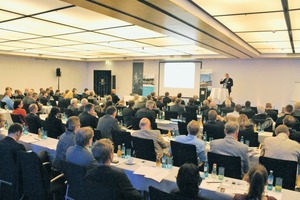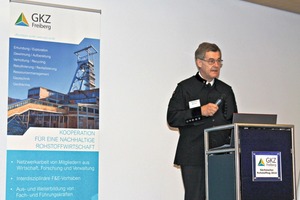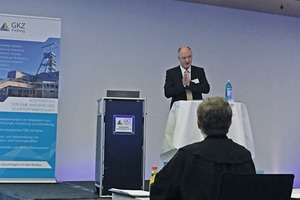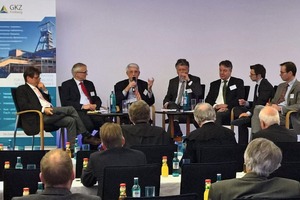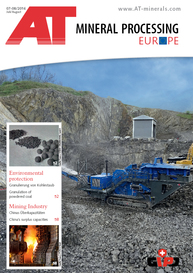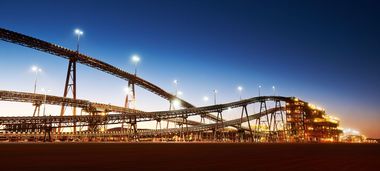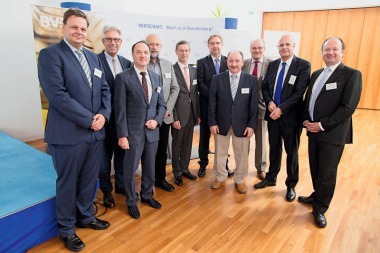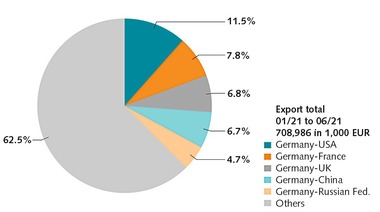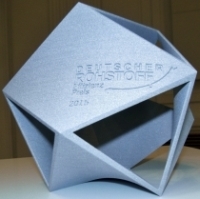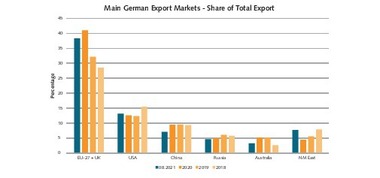Mining versus recycling or useful complement?
Around 100 experts from business, research and politics met for the 10th Saxon Raw Material Day in Dresden on May 25, 2016 in a conference themed “The future starts with the raw material – challenges for the international raw materials management”. In this context, they discussed long-term strategic concepts of states and enterprises for the safeguarding of raw materials with particular regard to mining. The input and discussions focused upon specific problems regarding both raw materials and deposits and new requirements concerning the emergence and quality of raw materials, the closing of materials cycles, the global alignment and the compliance with environmental and safety standards as well as the guarantee of societal acceptance of raw material extraction and research.
Obviously, mining and extraction companies along with research are faced with great problems which Dr.-Ing. Habil. Manfred Goedecke, President of the Geokompetenzzentrum GKZ e.V. Freibert had already addressed in his welcoming speech. The previous guiding principle “It all comes from the mine site” is taking more and more a back seat, which is a wrong and dangerous development. Reliable and affordable raw material supply needs to be ensured and for this reason, government and enterprises need to pursue a long-term raw materials policy which takes into account both primary and secondary raw materials. Dr. Goedicke also highlighted the necessity of continuous basic and industrial research as well as the respective education and further training. The so-called raw-material shift is an empty phrase, because the renunciation of mining is neither possible nor reasonable. In contrast to this, Germany would need a raw material offensive. Afterwards, he re-emphasized the responsibility of the government for the safeguarding of raw materials, but also for its educational task in this area. This would be the only possible way to pursue a credible raw material policy which would also lead to raw material acceptance and to positive raw material awareness among people. Our ancestors already knew: mining is not the work of one man!
Saxony’s Minister of State, Dulig, (Ministry for Economy, Labor and Transport) and patron of the event, also bewailed that mining, as the initial link of the value added chain, is no longer perceived by the public. This needs to be changed, as without mining safeguarding of raw materials will not be possible. Of course, recycling opportunities need to be identified and taken, but attention should be turned towards primary raw materials from the own production. For this purpose, the Saxon Raw Material Initiative ROHSA 3 needs to be continued, since it pursues the systematic acquisition, saving and evaluation of all relevant geological data for spars and ores in the Free State of Saxony to support mining investors and to re-explore old mining regions.
“The coal and ore location Freiberg with 800 years of knowledge competence in mining, with the resource university TU Bergakademie Freiberg, the Upper Mining Authority and the Helmholtz Institute for Resource Technologies characterizes Saxony as the leading German Federal Land for raw material management in Germany”, the Minister of State says.
In his lecture “Priorities and prospects of the international research aimed at the extraction of primary raw materials”, Prof. Dr. Peter Moser, Vice Chancellor of the University of Loeben (A) showed that Austria has a similar situation regarding the safeguarding of raw materials. Taking aluminum as an example (total production 55.5 million tons, 46.3 million tons from primary raw materials, 9.2 million tons from secondary raw materials), he described how urgently primary raw materials are still needed today. At the same time, he pointed to the long-life cycle of Al products. As risk factors for the raw material supply in Europe, he mentioned restrictions in the extraction of raw materials imposed by society, the lack of skilled engineers, of technical competence and of a positive investment climate for the mining sector. Additional factors are the failure of an EU raw material policy and the concentration of the raw material production on a few countries, but also political instabilities in the supplying countries outside Europe. There will be sufficient deposits on the European continent for the decades ahead, however development work regarding the exploration, extraction and preparation is required. Another important task is the comprehensive utilization of the extracted materials (example: exploiting the mountains of the Styrian limestone production in the cement industry). After all, new exploration methods should be applied and research on it should be conducted (in-situ mining: stone leaching, fracking, bioleaching). The same applies to the automation of mining in greater depths (“Mining 4.0”), the production of concentrates and the reduction of energy as well as the utilization of resources not yet available (transformation of serpentine with CO2 for the production of MgCO3, Fe-oxides and silicates). For this purpose, the professional training of engineers based on a modified profile needs to be improved. His plea: we create value, we do not destroy!
In his lecture themed “Preparation and recycling – key factors of the extraction of primary and secondary raw materials – challenges and developments”, Prof. Dr. Dr. h.c. Markus Reuter, Director of the Helmholtz Institute Freiberg for Resource Technology named the metallurgy as the basis of the closed loop recycling management. It is becoming increasingly necessary to improve the ability to measure, model, simulate and predict in order to realize whether a process is economically feasible. This also requires digitalization. Based on a number of examples of well-performing processing plants (e.g. Zn residues in Xingjiang, China) he demonstrated how a successful plant configuration and process management can be achieved by taking into account both the mentioned factors and thermodynamics. This modernization must also find its way into education and research, and professional training should be based on such modern methods (such as CE = Circular Economy, MIoT = Metallurgical Internet of Things, CEE = Circular Engineering Economy).
With its explanations “Extraterrestrial mining – a real task or science fiction?”, the lecture held by Dr. Matthias Meier, ETH Zurich, led the auditorium into the world outside our sphere of life. The focus of the discussion was put on the extraction of raw materials from asteroids. Despite all obstacles and imponderables that today still exist (technical conditions, costs, legal uncertainties), there is a real chance of using the tremendous quantity of available raw materials one day by exploiting the available solar energy on the spot. Some countries have already risen to this challenge with great seriousness, and it should be avoided that Europe lags behind. In this respect, time should be used to shift the balance between science fiction and reality towards the latter.
The “Challenges for K+S in the international raw material markets” were presented by Martin Ebeling, Plant Manager of the K + S Kali GmbH at the location in Neuhof-Ellers. He introduced the business with its three divisions of Fertilizers, Road Salts and Food and the two basic sectors of Potash and Salt, including production figures, product range and environmental protection measures. Besides the activities at home, one of the most important projects in the history of K + S is the Legacy-Mine in Canada. Like the previous speaker, Ebeling called for political and societal consensus as a precondition for the mining industry, since this would always have an effect on the environment. “Increasing competition in the raw material markets – implications for Germany as an industrial country” (Eva Stollberger, BDI e. V., Berlin) and “Raw material governance in technical cooperation: institutions, transparency, sustainability” (Dr. Leopold von Carlowitz, Deutsche Gesellschaft für Internationale Zusammenarbeit (GIZ) GmbH) were the topics of the lecture, which dealt with the raw material trade, the safeguarding of raw materials, international cooperation and sustainable development in the raw materials sector – not only in developing countries.
Following the lecture series, six experts (Fig. 2) answered questions of business journalist Thilo Boss within the framework of a panel discussion. His topic: Is Germany well prepared for the international competition for raw materials?
And he immediately started with the crucial question: Why do we have such an acceptance problem with raw material extraction? Where does the bad standing of the raw material industry come from? They were all very much of one mind: so far, and in particular in industry, raw materials were bought. In addition, lobbying for raw material extraction (mining) was bad, activities for the mining industry were not made public and – as Dr. Mann aptly stated – the beautiful German word “Bodenschatz” (means natural resource) was ignored. From this, it can be derived that the public information deficit needs to be wiped out and the value added chain consisting of mining – processing -high-performance product needs to be revealed.
The presenter reminded of the fact that the former Minister of Economic Affairs, Clement, was the last to publicly defend the mining industry. However, views regarding the domestic mining industry differ widely. Prof. Wellmer, for example, takes the line that Germany does not need the mining industry at all, and verifies it as follows: “The raw material prices have risen tremendously, for instance by the factor of 102 in the case of neodymium – and what happened? Nothing! This means, German engineers will come up with an idea!” Dr. Hoth however recalled that mining does not only mean ore mining and that even construction raw materials must be included in the considerations. Against this background he emphasized that risks exist along the entire value added chain, and not only in the mining industry.
Further topics included the high standards applicable in Germany and the increasing bureaucracy, which both put a heavy strain on enterprises. The same applies to the high energy costs which, however, are hardly reflected in the high-tech products.
Thus, is Germany well prepared for the international competition with regard to raw material supply? Even though China in particular is acquiring more and more mines in foreign countries (Brazil, Kenia etc.), Germany – due to its good reputation – has great opportunities to conclude international projects and co-operations which will really be implemented. And at this point, they were of the same mind again: Germany is obliged to have expertise in mining. And to ensure that this will be the case, public acceptance and political support for the exploration, extraction and processing of raw materials is required. “Otherwise, the world will outpace us”, as Prof. Reuter aptly phrased it.

